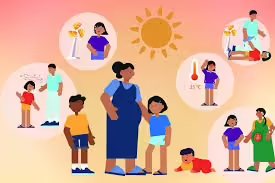Heatwaves are becoming increasingly common, and with them come health risks that can impact everyone. Knowing how to protect yourself during extreme temperatures is vital. This guide will provide you with essential health hacks to stay safe and cool when the heat is on.
Understanding Heatwaves and Their Impact
What is a Heatwave?
A heatwave is a period of abnormally high temperatures, often accompanied by high humidity, lasting more than a couple of days. They can occur anywhere but are particularly dangerous in areas unaccustomed to such heat.
Why Are Heatwaves Dangerous?
Heatwaves can lead to heat-related illnesses such as heat exhaustion and heatstroke. They can exacerbate existing health conditions and lead to dehydration, fatigue, and even death in severe cases.
Stay Hydrated
Drink Water Regularly
Hydration is key. Drink water throughout the day, even if you don’t feel thirsty. Aim for at least eight glasses a day, more if you’re active or outside.
Electrolyte Replacement
Sweating depletes your body of essential electrolytes. Replenish them with sports drinks or homemade solutions using water, salt, and sugar.
Keep Your Living Space Cool
Use Air Conditioning Wisely
Air conditioning is the most effective way to cool your home. If you don’t have it, spend time in public places like malls or libraries that do.
Fans and Ventilation
Fans can help, but they are more effective when used with other cooling methods. Ensure good ventilation by opening windows at night and closing them during the day.
Block Out the Sun
Use curtains or blinds to block direct sunlight during the hottest parts of the day. Reflective window films can also reduce indoor temperatures.
Dress for the Heat
Lightweight Clothing
Wear loose-fitting, lightweight, and light-colored clothing. Natural fabrics like cotton and linen are more breathable than synthetic fibers.
Protective Accessories
Hats, sunglasses, and umbrellas can provide shade and reduce heat exposure when you’re outdoors.
Eat Smart
Light and Frequent Meals
Eating smaller, more frequent meals can keep you cool. Heavy meals can increase your metabolic heat.
Hydrating Foods
Incorporate hydrating foods like cucumbers, melons, and leafy greens into your diet. These foods help maintain hydration and provide essential nutrients.
Cool Your Body Down
Cool Showers and Baths
A cool shower or bath can bring down your body temperature quickly. This is especially helpful before bedtime.
Cold Compresses
Use cold packs or damp cloths on your wrists, neck, and forehead to cool down quickly. This helps reduce your core temperature effectively.
Limit Physical Activity
Avoid Strenuous Activities
Limit outdoor activities during peak sun hours, typically from 10 a.m. to 4 p.m. If you must exercise, do it early in the morning or late in the evening.
Take Frequent Breaks
If you’re working or exercising outside, take frequent breaks in the shade or a cool area. This helps prevent overheating.
Stay Informed and Prepared
Monitor Weather Reports
Keep an eye on the weather forecast and heat advisories. Being informed helps you prepare and take necessary precautions.
Have an Emergency Plan
Know the signs of heat-related illnesses and what to do in case of an emergency. Having a plan can save lives.
Special Care for Vulnerable Groups
Elderly and Young Children
The elderly and young children are more susceptible to heat. Ensure they stay hydrated and cool, and check on them frequently.
Pets
Pets can suffer from heatstroke too. Provide them with plenty of water and keep them indoors or in the shade.
Optimize Your Sleep Environment
Cool Bedroom Tips
Keep your bedroom cool by using fans, and keeping blinds closed during the day. Lightweight, breathable bedding can also help.
Sleep Position and Clothing
Sleep in a spread-eagle position to allow air circulation. Wear light pajamas or sleep without clothing to stay cool.
Utilize Technology
Smart Thermostats
Smart thermostats can help maintain an optimal indoor temperature efficiently. Set them to cool your home before you return from work.
Cooling Gadgets
Consider investing in cooling gadgets like portable air conditioners, cooling mats, or personal fans.
Natural Cooling Methods
Houseplants
Certain houseplants like aloe vera and snake plants can help cool the air. They also improve air quality, making your home more comfortable.
Evaporative Cooling
Using a damp cloth and a fan can create an evaporative cooling effect. This method works well in dry climates.
Emergency Cooling Centers
Local Resources
Know where your local cooling centers are. These are places like community centers or shelters that offer a cool refuge during extreme heat.
Community Support
Check on your neighbors, especially the elderly or those with health conditions. Community support can make a big difference during a heatwave.
Protecting yourself during a heatwave is about preparation and smart choices. Stay hydrated, keep your living space cool, dress appropriately, and stay informed. By following these health hacks, you can enjoy the summer safely and comfortably.




